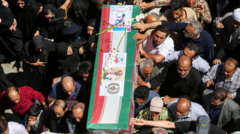Iran has held a significant state funeral for approximately 60 individuals, primarily military leaders and nuclear scientists, who lost their lives during the recent 12-day conflict with Israel.
Iran Conducts State Funeral for Military Leaders Lost in Conflict with Israel

Iran Conducts State Funeral for Military Leaders Lost in Conflict with Israel
Ceremony honors 60 casualties, including high-ranking officials, amid ongoing geopolitical tensions.
Massive crowds gathered near Enghelab Square in central Tehran to pay their respects, as coffins draped in the Iranian flag and adorned with portraits of the fallen commanders were prominently displayed. The conflict, which has recently concluded with a ceasefire after the United States engaged via airstrikes on vital Iranian nuclear facilities, has left the nation in mourning.
Among those commemorated was Mohammad Bagheri, the highest-ranking officer in Iran, who served as the chief of staff for the military. Mourners clad in black chanted patriotic slogans while holding Iranian flags and images of the deceased. The funeral service also recognized Hossein Salami, the commander-in-chief of Iran’s Revolutionary Guards, in addition to various nuclear experts, including Mohammad Mehdi Tehranchi, the former head of Azad University in Tehran.
This memorial event follows a series of threats made by former U.S. President Donald Trump, who recently declared he would not hesitate to order further strikes on Iran if deemed necessary based on intelligence regarding uranium enrichment capabilities. Trump disparaged Iranian Supreme Leader Ayatollah Ali Khamenei, insisting that his claims of victory over Israel were unfounded. He recounted his knowledge of Khamenei's whereabouts and implied that he had spared him from an unseemly end.
In response, Iran's Foreign Minister Abbas Araghchi cautioned Trump against disrespecting Khamenei, suggesting that if Trump is earnest about negotiating a deal, he should adjust his tone. The minister further affirmed that while Iran had suffered "serious" damage to their nuclear infrastructure, the Iranian people remain resilient against threats to their sovereignty.
As Tehran grapples with the aftermath of the conflict, the city remains vibrant yet shaken, reflecting the ongoing tensions in the region.





















